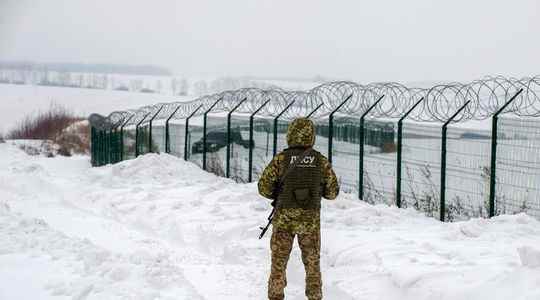Is this a first sign of de-escalation? Paris, Berlin and NATO noted this Tuesday a first “positive” sign after the announcement of a partial withdrawal of the Russian forces deployed around Ukraine, which have raised fears for weeks of an invasion and a major war. .
The Russian Ministry of Defense announced, before a meeting in Moscow between German Chancellor Olaf Scholz and Vladimir Putin, that some of the 100,000 men deployed were returning to garrison on Tuesday, broadcasting images of armored vehicles loaded on a train.
The Russian president has confirmed this “partial withdrawal”, but neither the Kremlin nor the army have detailed the timetable or the extent. Russia is also continuing important maneuvers in Belarus, a pro-Russian neighbor (to say the least) of Ukraine, until February 20. A cyberattack also targeted the Ukrainian Defense Ministry on Tuesday, as well as banks. Acts difficult to link with the Russian power, but which nevertheless intervene in this context of extreme tension. On Monday, the United States, still judging the risk to be at its maximum, abandoned its embassy in Kiev to install it in Lviv, further west.
“Cautious Optimism”
“The fact that we now hear that some troops are withdrawn is in any case a good sign. We hope that there will still be follow-ups,” the German chancellor said in Moscow during a press conference with the president. Russian. NATO Secretary General Jens Stoltenberg for his part expressed “cautious optimism”, while saying he was waiting for a “sign of de-escalation”.
“Words are good. We are waiting for actions. If the actions are there, it will be even better”, launched the head of French diplomacy, Jean-Yves Le Drian, at the National Assembly. US President Joe Biden was also expected to speak on the subject in the evening, and reiterate that the United States “remains open to high-level diplomatic exchanges in close coordination with [ses] allies”, according to a press release. And a new telephone call between heads of Russian and American diplomacy took place on Tuesday, reported the American State Department.
Kiev finally welcomed the union of Ukraine and its Western allies which “prevented any further escalation by Russia”. Vladimir Putin for his part assured that “of course” he did not want a war, while hammering that the expansion of NATO and the ambitions of Ukraine to join the Alliance constituted a threat for Russia .
Negotiations still complex… and at a standstill
Vladimir Putin and Olaf Scholz insisted on wanting a process of negotiations on security issues in Europe. Westerners and Moscow must find a compromise “without abandoning their principles”, noted Olaf Scholz, “it is our damn duty to commit ourselves to peace”.
“We are ready to go on the path of negotiation,” repeated the master of the Kremlin. However, he denounced the rejection by Westerners of his main demands, deploring not having received “a constructive response”.
These demands are an end to the Alliance’s enlargement policy, a commitment not to deploy offensive weapons near Russian territory and the withdrawal of NATO infrastructure from Eastern Europe. These demands were rejected by the West, who offered in exchange talks on subjects such as arms control, visits to sensitive installations or discussions on Russian security fears.
Germany remains optimistic. “There are enough bases for discussion for things to evolve positively and we must use these bases for discussion”, underlined Olaf Scholz.
